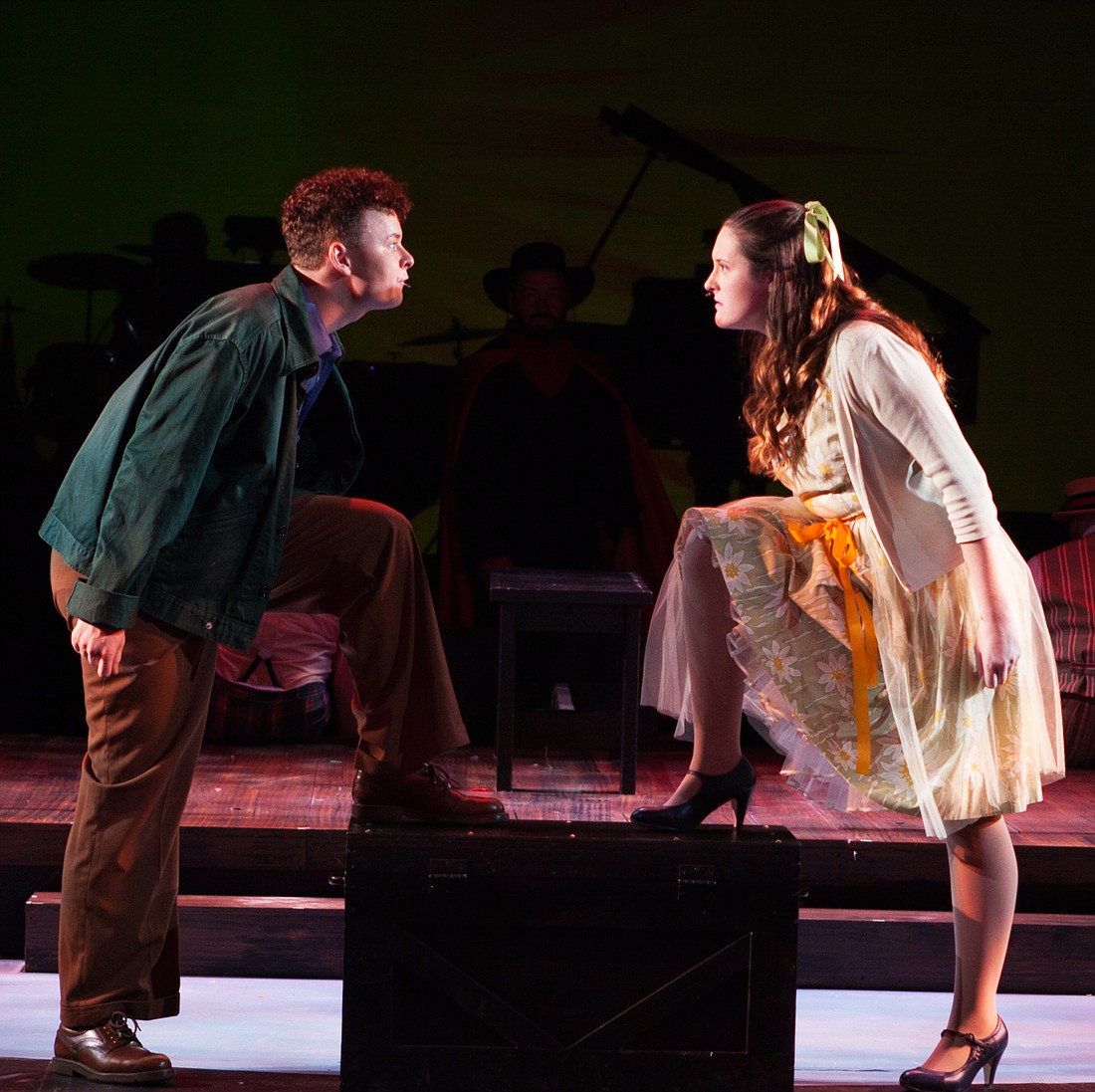- May 5, 2025
-
-
Loading

Loading

Playwright Edmond Rostand had a gift for high-concept before the term was invented. “Cyrano de Bergerac” (1897) made a big splash with a hero with a big nose. “Les Romanesques” (1894) was equally clever. Composer Harvey Schmidt and lyricist Tom Jones cleverly adapted it as “The Fantasticks” in 1960. It became the longest-running musical in theatrical history. It’s running now at The Players Centre.
Rostand’s fantastic idea? Flip the plot of “Romeo and Juliet” and give it a happy ending. Schmidt and Jones were happy to follow. The plot?
Two households, both alike in dignity. Next-door neighbors, divided by a wall. Bellamy (Bill Sarazen) lives with his daughter, Luisa (Emma Devine). Hucklebee (Mark Eichorn) lives with his son, Matt (Eli Gilbert). In a bit of reverse psychology, the fathers fake a family feud to trick their kids into falling in love and ultimately getting married. (Forbidden fruit is always the sweetest, eh?) The scheme works, and the kids get sweet on each other. To seal the deal, the fathers plan a fake abduction so Matt can play the hero and rescue Luisa. (They figure chicks dig being rescued.) To stage this scene, they hire El Gallo (Chip Fisher), a flamboyant trickster figure who earns a living with banditry and fake kidnappings. The loving scam works — and yields a happy ending in the moonlight. But the first act blows up the romantic balloon, so the second act can pop it. The harsh light of day melts night’s lovely fantasies. The fathers’ fraud is exposed. The disillusioned kids break up. Matt hits the road and reprises the sufferings of the prodigal son. Luisa sulks and is presumably seduced by El Gallo. The fathers have a genuine feud. (Pssst. This torment is designed to build character.) All is lost! Nah. They all get back together, and there’s a happy ending, for real.
Director Michael Newton-Brown honors the stylized tone of this fractured fairy tale. In Shakespeare, “All the world is a stage.” In “The Fantasticks,” there are worlds within worlds and stages within stages. Artifice rules in every scene. Real or unreal, Newton-Brown keeps it light as a soap bubble.
Gilbert’s Matt is winning as a clueless, callow lad in love who wises up in the School of Hard Knocks. Devine is divine as Luisa. Graceful, delicate, flighty and lighter than air. Fisher’s cape-twirling El Gallo is the most interesting man in the musical. (He probably drinks Dos Equis beer.) He’s the villain, but not exactly. (His dirty deeds are meant for good.) He’s human, but maybe not. (He seems to have magic powers). Eichorn and Sarazen create a nice comic rhythm as the two dads. Their characters are part “Our Town,” part “Waiting for Godot.” Bob Fahey and David Russell are equally hilarious as two washed-up actors. Fahey’s doddering thespian makes word salad out of Shakespeare’s sonnets; Russell is a beer-bellied, imitation American Indian who specializes in death scenes. Kay Siebold’s wistful “Mute” does a bit of mime personifying the wordless wall and dispensing props when needed.
Speaking of which, Charlie Logan’s choreography walks the edge of mime. There’s no hard line between dance, motion and gesture. It’s one of many ways this musical blurs boundaries. Starting with the suspension of disbelief.
Newton-Brown’s set is a stage on a stage. A platform with six poles stands in for the two households. It’s also suitable for draping “The Fantasticks” banner and hiding the two families while they supposedly hold a pose. Random actors also emerge from a trunk.
Georgina Willmott’s costumes fit the shorthand of sitcom characters. Bellamy and Hucklebee sport suitably shlubby dad clothes. El Gallo is the classic Snidely Whiplash villain.
Michael Pasquini’s lighting and projection are also suitably stagey. Rear projection makes do for sun and moon. Nobody’s fooled.
The musical’s imitation of life doesn’t try too hard. It’s theater about theater. Instead of holding up a mirror up to life, it holds a mirror up to another mirror. Behold! A glimpse of infinity! But the illusion is obvious.
Strawberry fields, nothing is real.
Reality aside, the show aims for your heart without ignoring your head. Alan Corey’s musical direction makes the most of Schmidt’s heartstring-plucking tunes. Yes, there are plenty of weepers, but there’s more — and that surprised me.
Based on endless replays of “Try to Remember,” I was expecting a sentimental honeypot. This musical is, sometimes, but there’s also surprising depth. Schmidt’s score is closer to opera than the standard Broadway show tune. Jones’ lyrics and libretto are wickedly clever. And stuffed with self-conscious, self-referential jokes. That was the biggest surprise of all.
“The Fantasticks” is relentlessly artificial. They would have called it post-modern if had come out in 1965.
In 2019, you can still call it entertaining.